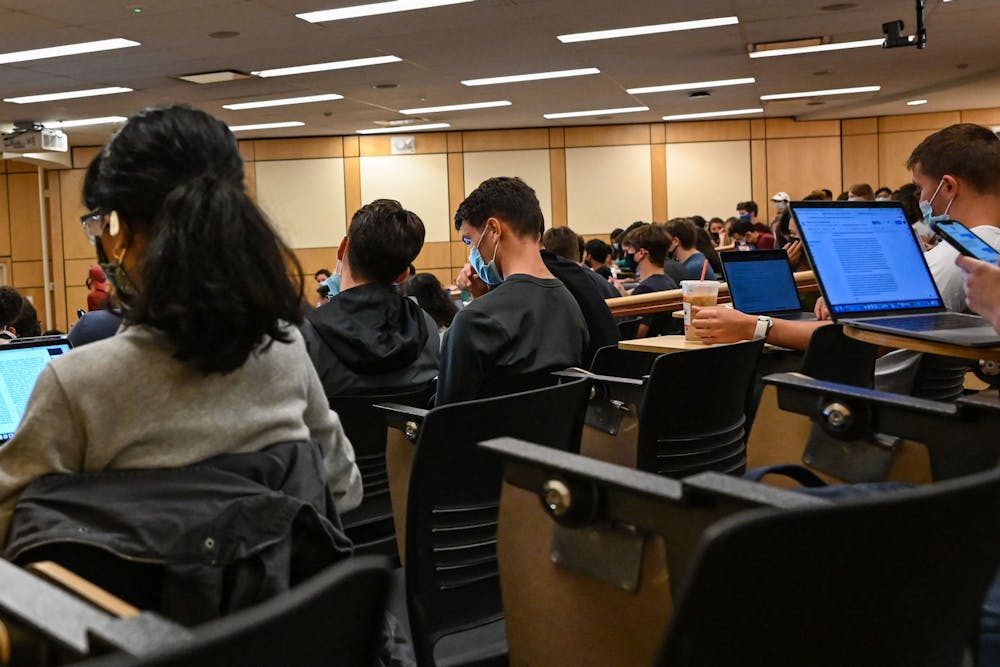Penn has reversed its plan to make masks optional in classrooms starting March 28 — keeping the current mandate in place for the time being.
The in-classroom mask mandate is one of the COVID-19 mitigation measures still in place after the March 15 University-wide announcement which lifted the requirement for masking in all indoor spaces and indicated the policy for classrooms would change on March 28. The continuation of the classroom masking requirement does not currently have an end date.
In a Thursday afternoon email to the Penn community, Interim President Wendell Pritchett, Interim Provost Beth Winkelstein, Senior Executive Vice President Craig Carnaroli, and Executive Vice President for the Health System J. Larry Jameson wrote that the decision to extend the requirement of masks in classrooms was implemented following consultations with Penn community members.
“Our highest priority is to maximally protect the health of our community as we all head into the closing weeks of the semester, final exams, and Commencement,” the administrators wrote.
Chief Wellness Officer Benoit Dubé told The Daily Pennsylvanian that the decision to extend the requirement of masks in classrooms was implemented following consultations with “student and faculty stakeholders on campus.”
“We’re in this as a community, and we make decisions as a community,” Dubé said.
While University administrators did not provide an end date for the policy in the message, Dubé clarified that this does not mean the mandate will continue forever. He added that there was a “very clear” intention with the email to not create false expectations surrounding the exact date when Penn will revisit the classroom COVID-19 guidelines.
“It’s a provisional decision,” Dubé said. “That’s the most important thing to remember.”
RELATED:
Students, professors report ‘very mixed feelings’ as Penn prepares to go mask optional in classes
Penn drops mask mandate in most indoor settings, effective immediately
Amid the change in guidance, the COVID-19 case count and positivity rate have remained relatively stable following the week of spring break.
A total of 132 community members tested positive for COVID-19 during the week from March 13 to March 19 — up 108 cases from the week before. Undergraduates comprised less than half of the new cases.
The campuswide positivity rate increased to 2.39%, breaking a five-week trend where it had remained between 1% and 2%. Graduate students saw the highest positivity rate in seven weeks at 2.59%.
Dubé told the DP on March 17 that a slight uptick in the positivity rate was to be expected.
"We're definitely going to see an increase in the positivity rate, but then we need to unlearn bad habits," Dubé said. "The habit we have been trained to react to for two years now has been like, 'We're at this percentage,' and that's no longer a depiction of the level of concern we should have."
Following widespread travel over spring break, Dubé said that he had expected a “natural” increase in cases. Additionally, he pointed out that the University recently moved to exempt fully vaccinated community members — who also received their booster shots — from COVID-19 testing.
This, Dubé added, means that the individuals most protected against the virus no longer have to participate in testing, creating the potential for an increased positivity rate.
“Being concerned should be replaced with being aware,” Dubé said. “We're changing the story because it's no longer just about cases, but it's about how sick people are and who needs to protect themselves."
While indoor masking is not mandated in most indoor spaces, masking is still encouraged by the University.
“We have a central policy, but we do hope that we’ve created a community of care where a dialogue about masking can happen, where no one should feel embarrassed or ashamed to express a preference, but also respect that people have different thresholds for how they want to protect themselves with a high-quality, well-fitting mask," Dubé said.









